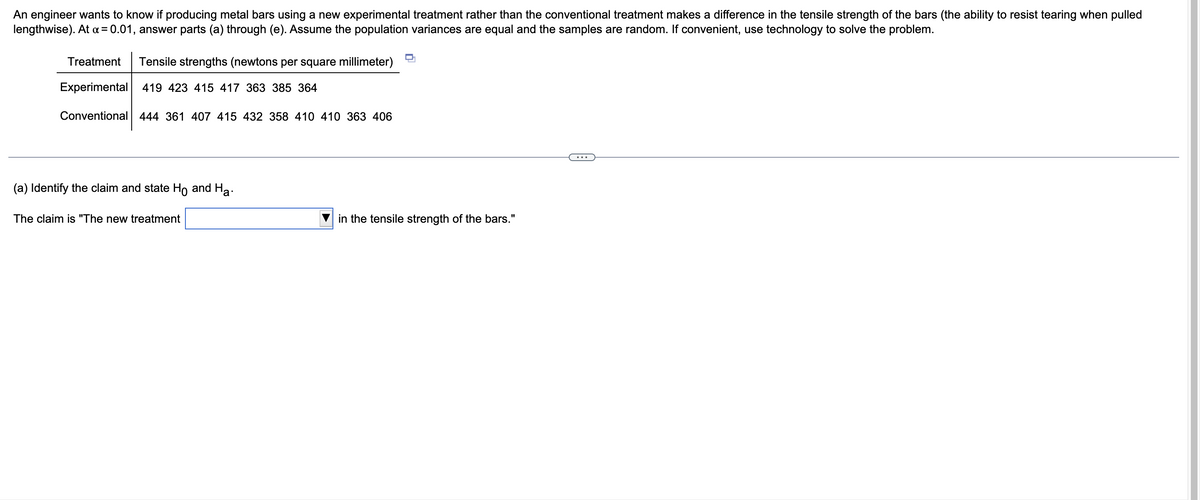An engineer wants to know if producing metal bars using a new experimental treatment rather than the conventional treatment makes a difference in the tensile strength of the bars (the ability to resist tearing when pulled lengthwise). At a = 0.01, answer parts (a) through (e). Assume the population variances are equal and the samples are random. If convenient, use technology to solve the problem. Treatment Tensile strengths (newtons per square millimeter) Experimental 419 423 415 417 363 385 364 Conventional 444 361 407 415 432 358 410 410 363 406 (a) Identify the claim and state Ho and Ha- The claim is "The new treatment. in the tensile strength of the bars."
An engineer wants to know if producing metal bars using a new experimental treatment rather than the conventional treatment makes a difference in the tensile strength of the bars (the ability to resist tearing when pulled lengthwise). At a = 0.01, answer parts (a) through (e). Assume the population variances are equal and the samples are random. If convenient, use technology to solve the problem. Treatment Tensile strengths (newtons per square millimeter) Experimental 419 423 415 417 363 385 364 Conventional 444 361 407 415 432 358 410 410 363 406 (a) Identify the claim and state Ho and Ha- The claim is "The new treatment. in the tensile strength of the bars."
Glencoe Algebra 1, Student Edition, 9780079039897, 0079039898, 2018
18th Edition
ISBN:9780079039897
Author:Carter
Publisher:Carter
Chapter10: Statistics
Section10.1: Measures Of Center
Problem 9PPS
Related questions
Question
.) Find the critical? value(s) and identify the rejection? region(s).
C.) Find the standardized test statistic.
D.) Decide whether to reject or fail to reject the null hypothesis.
E.) Interpret the decision in the context of the original claim.

Transcribed Image Text:An engineer wants to know if producing metal bars using a new experimental treatment rather than the conventional treatment makes a difference in the tensile strength of the bars (the ability to resist tearing when pulled
lengthwise). At x = 0.01, answer parts (a) through (e). Assume the population variances are equal and the samples are random. If convenient, use technology to solve the problem.
Treatment Tensile strengths (newtons per square millimeter)
Experimental 419 423 415 417 363 385 364
Conventional 444 361 407 415 432 358 410 410 363 406
(a) Identify the claim and state Ho and Ha.
The claim is "The new treatment
in the tensile strength of the bars."
Expert Solution
This question has been solved!
Explore an expertly crafted, step-by-step solution for a thorough understanding of key concepts.
Step by step
Solved in 2 steps with 4 images

Recommended textbooks for you

Glencoe Algebra 1, Student Edition, 9780079039897…
Algebra
ISBN:
9780079039897
Author:
Carter
Publisher:
McGraw Hill

Glencoe Algebra 1, Student Edition, 9780079039897…
Algebra
ISBN:
9780079039897
Author:
Carter
Publisher:
McGraw Hill